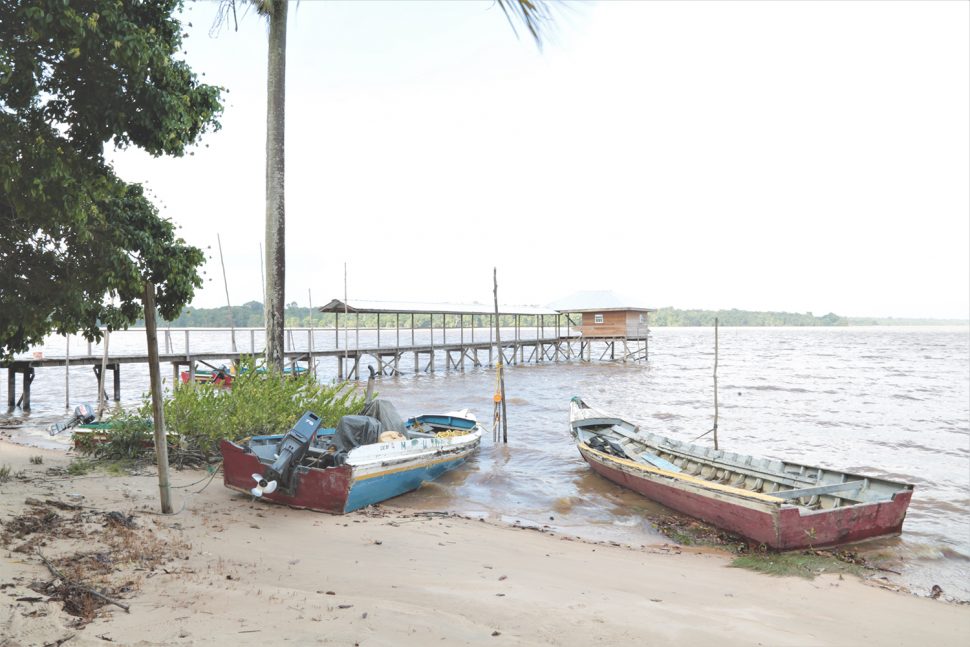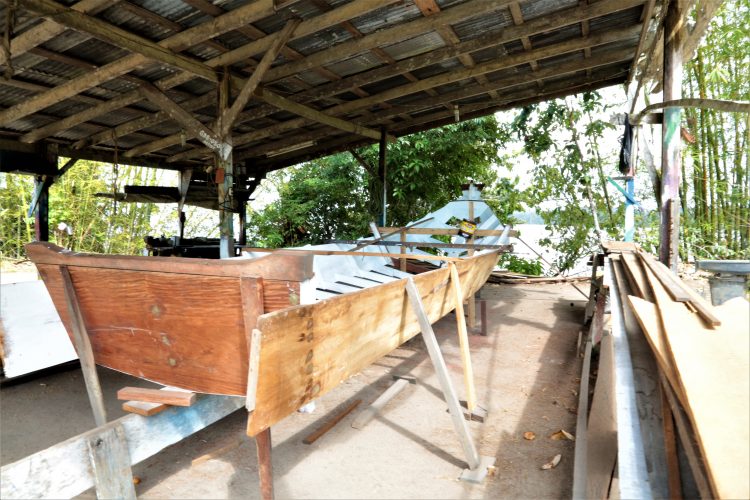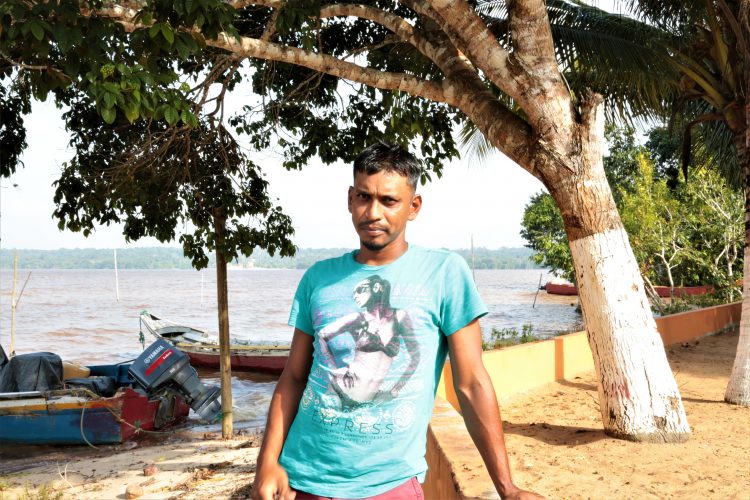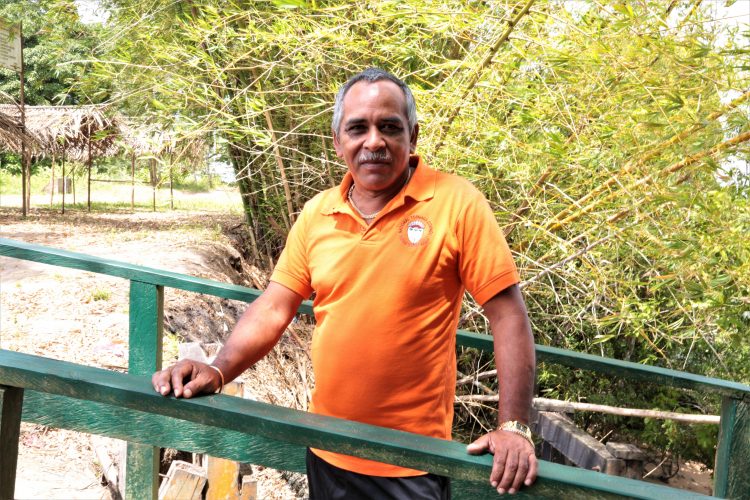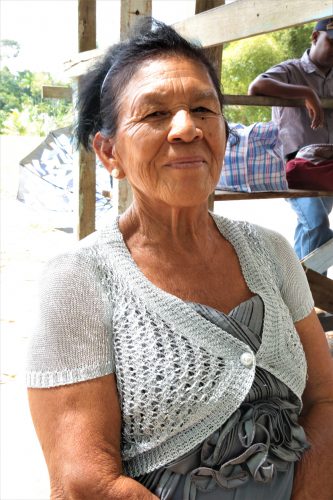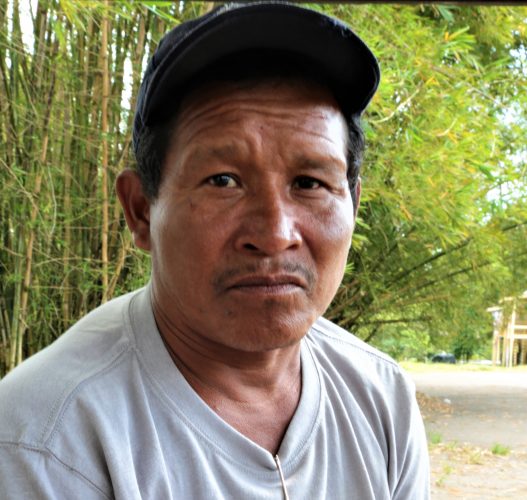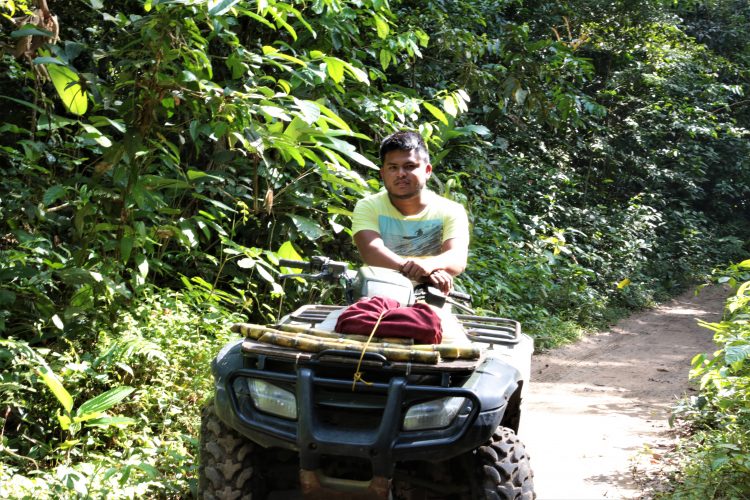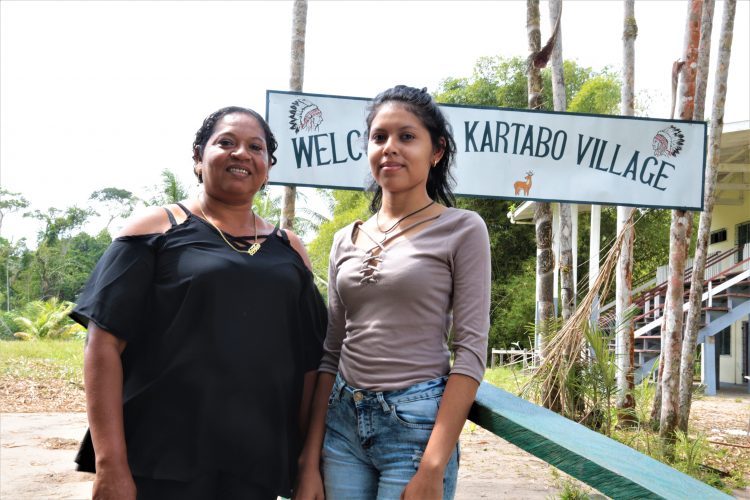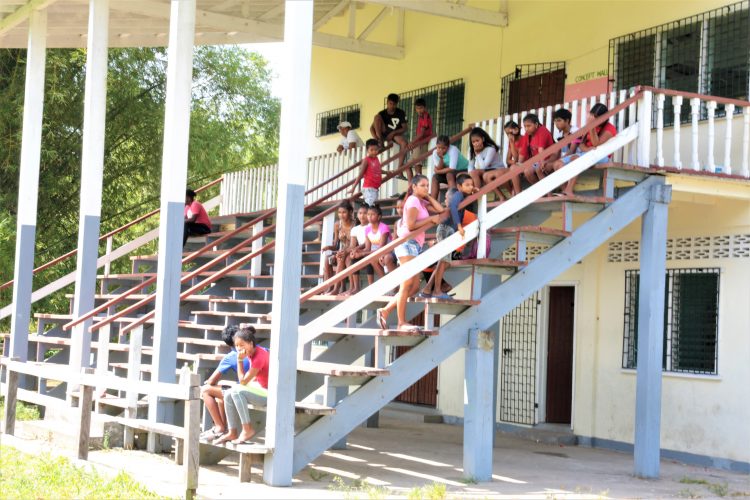The village of Kartabo is situated in the lower Mazaruni, six miles from Bartica. It is home to a mixed group of people, the largest concentration being Indigenous folk of Carib descent, followed by Arawaks/Lokonos and Akawaios.
The village is named after a crater on Mars called Katabo which was named in 1976. However, the village has existed longer than 1976 and is said to have been around since the 17th century. This belief possibly stems from the fact that one has to pass Fort Kyk-Over-Al, which sits at the junction of the Cuyuni, Mazaruni and Essequibo rivers to get to Kartabo. A few elderly residents said that their parents were born at Kartabo, while their grandparents would have arrived from other communities in Guyana.
My journey by boat began at Parika. Though one can go by ferry, this was not possible with a day trip. The ferry travels on Mondays, Tuesdays, Thursdays and Fridays at the same time and on different schedules on Saturdays and Sundays. On these days it leaves Parika at 5 am and takes about 3 to 4 hours depending on the tide to get to Bartica; it departs Bartica at midday to get back 5 hours later. The fare is $500 per adult. A speedboat which comes at the cost of $2,500 takes just an hour and ten minutes. The smaller speedboats which run to Kartabo and other places like Itaballi and Aruwai Resort can be found at the Bartica Stelling or at the once famous restaurant and bar called Cool Breeze.
We passed by huge boulders of rocks sitting in the Mazaruni, the Mazaruni Prison, Fort Kyk-Over-Al and the Awurai Resort. Fifteen minutes later and fifteen hundred dollars lighter I stepped onto the boardwalk at Kartabo.
A small group of persons waited beneath a shed; they were expecting the visit. As always as is with those living in the countryside, the welcome was warm.
Chairman of Kartabo Lloyd Williams moved to the community when he was nine years old; this was 43 years ago. His mother hails from Kartabo but had moved to live in Bartica where he was born. Williams has been the chairman of the village a little more than three years now. Kartabo, he said, is divided into four sections – Westerbeck, The Point, Tacohaiya Bay and The Village where the school and other government facilities are situated. The Point it was noted is so called because it happens to be the meeting point of the Cuyuni and Mazaruni rivers. A boardwalk at the exact part the rivers meet is the landmark to represent this. The main mode of transportation is walking. Though not many houses can be made out when nearing the village, it was noted the residents live along the edge of the village while most of the village is forest. Having a forest right at one’s doorstep can be both beneficial and dangerous. It is good for hunting deer, tapir, bush hogs and labba. However, jaguars and other cats also call the forest their home and from time to time the village people would see them staring at them from the edge of the forest. They would also make off with their dogs and chickens occasionally. But there is also the danger of mosquitoes; many of the residents would have been infected with Malaria more than once in their lifetime.
The community has a health post, a community centre and a primary school which houses the nursery department. Nearby the school are the teachers’ living quarters. The school has 5 teachers and 72 children attending both the nursery and primary departments. Seventeen of the village’s children attend secondary school. With no secondary school in the village, the children travel to Bartica for school. However, parents are not as financially constrained as the government has provided them with a school boat that takes them to and from the town.
When Williams was younger, there was no school in the village. He attended St Edwards Primary which was situated at one of the quarries nearby. Though he could have chosen to return to Bartica, the peaceful atmosphere of the village made him stay on.
The community centre ground, Williams said, is filled with village children every afternoon. The man noted also that the village has a very strong women’s cricket team which finished second at last year’s Amerindian Heritage Games. The men do not do much with regard to sports as they are often away working in the gold mines, or doing logging. Whenever they are at home they are taken up with fishing or farming. However, on the last village day in October, the village hosted the first ever five-a-side football game; this is usually hosted in the other villages during Amerindian Heritage Month. The men are now trying to create their own team to represent Kartabo at such events. The ground is not levelled as needed. In fact, it is also rather small and he is requesting the government allow the village a bigger portion of land somewhere in the village. More need to be done for the village youths, the man insisted noting also that last year his niece who hails from Kartabo represented Guyana in the island of Bermuda handling the shotput games returning with the gold medal.
The community centre includes a pavilion, which villagers make full use of. Two computers are locked away in the building which has never been used as yet and was explained by the chairman, the computers have not yet been officially handed over by the ministry, though this should have happened a long time now. Secondary school students when tasked with their assignments will do their necessary research at home but their printing has to be done at Bartica. Williams is hoping the villagers can have access to the computers soon and while they may not have access to Wi-Fi they can have their phones hooked up to the computers and use their data.
The health post has two health workers who take care of cases such as the common cold and hold prenatal clinics. Mothers are required to travel to Bartica to have their babies delivered. On days when the river is rough, a woman in labour may have to deal with more than she bargained for. Williams wishes the health post to be better equipped to handle other clinics and allow for delivery of babies.
Although the villagers are provided water by a well, not all of them live in the area to have access to the water. Those who are too far away from the well depend on the rain. Persons have used the river water to wash their dishes or brush their teeth exposing themselves to typhoid. Because of mining operations in the distance, the water is not healthy.
Roy Francis is the chairman of the Kartabo Policing Group and the treasurer of the F1 Division Policing Group in Region Seven. He has been chairman of the Kartabo Policing Group for three years. He was once chairman of the village from 2010 to 2012.
Francis hails from Mabaruma, Region One. He left his hometown to work in logging at Berbice. Realizing that Bartica paid better he moved with his family here. By the time he was planning on returning to Mabaruma more of his relatives had settled in Kartabo and so he stayed.
Francis noted that since he became the chairman of the group there have been a few changes. The number of neighbour disputes and domestic disputes has dropped significantly and this may have been the result with the Bartica Police being more involved in Kartabo and the communities around. The police, he said, would see to it that the Policing Group boat always has gas to make their trips.
Francis has a wife and 4 children. He does farming, and would set his seine for fish in the Mazaruni. He shares that when the men would wait for the tide to get high before they put out their seines. It is not a wise idea to leave their seines overnight as they may be stolen.
Speaking about the health post, Francis noted that there is no microscope at the facility for the health workers to check for malaria, which he has had 5 times already.
“We have lots of cats in the area; plenty of them. Sometimes they are as big as 3 feet or 5 feet. The biggest one I ever see had 6 feet. They would carry away our dogs and fowls,” Francis said speaking about one of the common animals sighted.
The biggest challenge in the area he noted is employment adding that the men would have to be away from their homes months at a time. As a farmer it is difficult for him to make enough money as he would sell wholesale to the vendors in Bartica. Jobs are especially hard to come by for women who would in most cases have no other option but to tend to the home; those wanting more tend to leave the village.
Francis requests that more be done for the village in regard to education, the health system, employment and sports.
Sixty-five-year-old Grace Williams better known in the village as Aunty Gracie, was born and raised in Kartabo. Her parents were born in the village also while one set of her grandparents came from Region One.
She attended St Edwards Primary School. Her mother would take her and her siblings to school when she was little. Her parents tended a farm of ground provision, pineapples and watermelons. They cut logs further up in the river and sold them to sawmills.
Aunty Gracie mans her own boat and would travel to Bartica to buy her groceries and vegetables although boats visit the village selling fruits and vegetables. Every two weeks she makes the trip to Bartica; she takes her 75-year-old husband who is also visually impaired to the clinic there.
On Sundays, she attends the Lighthouse Assembly of God’s Church. The village also has the Seventh Day Adventist Church.
When she is at home she tends to her kitchen garden. “Sometimes the acushi ants would come and eat them out. Sometimes I would trace the road, put some dry bush inside and burn it before them come. They does cut out everything,” she said.
Aside from their farm the elderly couple depend on their old age pensions to take care of them. Her son who lives in the village and works in the interior helps.
Cabesh Persaud sat chatting with friends at the riverside. He was born in Aurora on the Essequibo Coast. His mother hails from Kartabo and brought him there when he was just a few months old. Sometimes he makes the hour trip with his own boat to Supenaam to visit relatives.
Persaud is a gold miner. When we met he was out for a few days and was scheduled to return anytime. When he is out, he looks forward to playing games at the ground.
His biggest concern is the education system in the village. Persaud has 2 children who attend schools in Georgetown. “We need better schooling here. We need better qualified teachers…,” he said.
